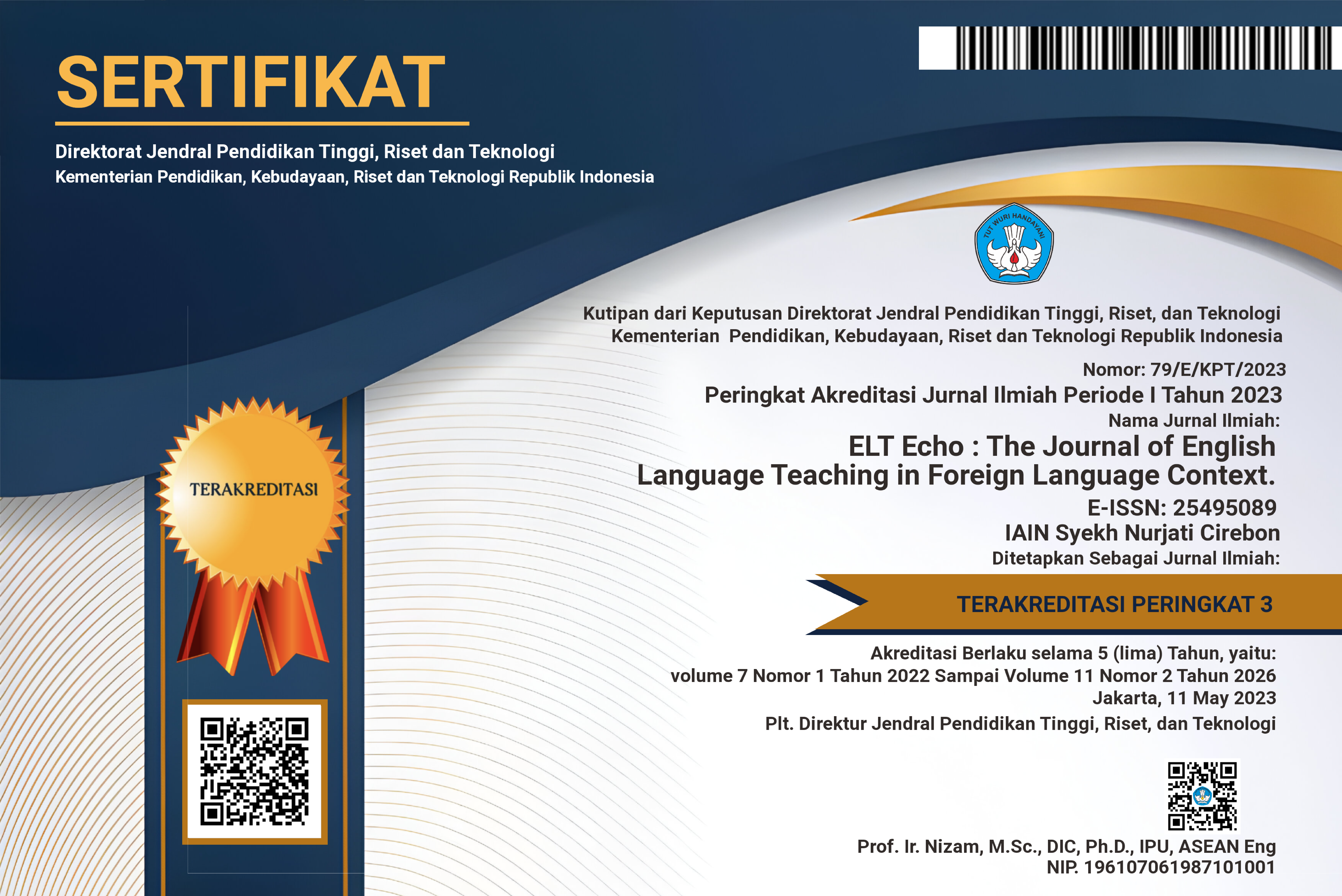INVESTIGATING STUDENTS’ FAMILIARITY WITH CONVERSION, AN ENGLISH WORD FORMATION PROCESS
(1) Sanata Dharma University, Yogyakarta
(2) Sanata Dharma University, Yogyakarta
(*) Corresponding Author
Abstract
Keywords
Full Text:
PDFReferences
Achmad, S. (2013). An applied linguistic study at competitive class of junior high schools in Gorontalo city, Indonesia. International Journal of Linguistics, 5(5), 75-97.
Alqahtani, M. (2015). The importance of vocabulary in language learning and how to be taught. International Journal of Teaching and Education, 3(3), 21-34.
Bauer, L. (2004). Morphological productivity. Cambridge: Cambridge University Press.
Bram, B. (2011). Major total conversion in English: The question of directionality.
(Doctoral dissertation, Victoria University of Wellington, Wellington). Retrieved from http://researcharchive.vuw.ac.nz/handle/10063/1898
Bram, B. (2012). Three models of English morphology. LLT Journal: A Journal on Language and Language Teaching, 15(1), 179-185. Retrieved from https://e-journal.usd.ac.id/index.php/LLT/article/view/316
Cahyono, B. Y. & Widiati, U. (2008). The teaching of EFL vocabulary in the Indonesian context: The state of the art. TEFLIN Journal, 19(1), 1-17.
Cambridge Dictionary. (2019). Retrieved on December 9, from https://dictionary.cambridge.org/
Dominguez, J. F. (2007). A contribution to the study of conversion in English. SKASE Journal of Translation and Interpretation, 4(2), 73-80.
Haspelmath, M. & Sims, A. D. (2010). Understanding morphology (2nd ed.). London: Hodder Education.
Johnson, R. B., & Christensen, L. (2014). Educational research: Quantitative, qualitative, and mixed approaches (5th
ed.). Thousand Oaks, CA: Sage Publications.
Kang, S. (2007). Zero derivation in English: Base-identity amd constraint indexation. The Linguistic Association of Korea Journal, 15(4), 77-96.
Katamba, F. (2005). English words. New York: Routledge.
Kisselew, M., Rimell, L., Palmer, A. & Pado, S. (2016). Proceedings of SIGMORPHON: Predicting the direction of derivation in English conversion. Berlin: Association for Computational Linguistics.
Lily. (2019). The correlation between students’ mastery in vocabulary and their ability in comprehending an English for specific purpose (ESP) text. Wahana Inovasi, 8(1), 215-220.
Linse, C. T., & Nunan, D. (2005). Practical English language teaching: Young learners. New York: McGraw-Hill.
Litosseliti, L. (2010). Research methods in linguistics. New York: Continuum International Publishing Group.
Luthfiyati, D., Kholiq, A. & Zahroh, I. N. (2017). The analysis of word formation processes in the Jakarta post website. Journal of Linguistics, English Education and Art, 1(1), 30-36.
Oxford Learner’s Dictionary. (2019). Retrieved on December 10, 2019, from https://www.oxfordlearnersdictionaries.com/
Plang, I. (2002). Word-formation in English. Cambridge: Cambridge University Press.
Prasetyo, W. (2015). Correlation between English word formation process mastery and English reading comprehension of eleventh grade students at SMAN 2 Trenggalek. Dewantara, 1(1), 1-14.
Quirk, R., Greenbaum, S., Leech, G., & Svartvik, J. (1985). A comprehensive grammar of the English Language. New York: Longman.
Ratih, E. & Gusdian, R. I. (2018). Word formation processes in English new words of Oxford English dictionary (OED) online. A Journal of Culture, English Language Teaching, Literature & Linguistics, 5(2), 24-35.
Subekti, N. B. & Lawson, M. J. (2007). Vocabulary acquisition strategies of Indonesian postgraduate students through reading. International Education Journal, 8(2), 485-496.
Velasco, D. G. (2009). Conversion in English and its implications for functional discourse grammar. Lingua, 199, 1164-1185.
Yule, G. (1996). The study of language (2nd ed.). Cambridge: Cambridge University Press.
Yule, G. (2005). The study of language (3rd ed.). Cambridge: Cambridge University Press.
Yule, G. (2017). The study of language (6th ed.). Cambridge: Cambridge University Press.
DOI: 10.24235/eltecho.v5i1.6320
Article Metrics
Abstract view : 86 timesPDF - 30 times
Refbacks
- There are currently no refbacks.
Â
This Journal is indexed by:
Â

This work is licensed under a Creative Commons Attribution 4.0 International License.










